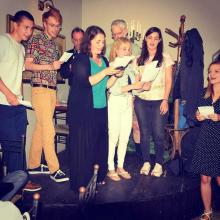Nathan Marks UWPSEC Scholarship Dates: July 3-August 13, 2016
Impressions from my trip to Poland
The Polish language is something that has attracted me since I was an undergraduate. I was a chemistry major when I started out at Purdue in 2008. I quickly learned that it wasn’t my calling. I decided on linguistics, the field that I should have been in from the beginning. At that time, I was taking Ancient Greek but, having a friend in Poland, I became very interested in Polish. Sadly, Purdue no longer offered Polish. I finally got the chance to take the language that really caused my whole academic life to shift from chemistry to linguistics during my first year of graduate study at the University of Washington.
The first full academic year of Polish was exciting and interesting. Russian is, I guess we can say, my primary language, in terms of my linguistic interest and research. After the first year of Polish I made the decision that I wanted to study abroad and learn more Polish. I was lucky that the UW PSEC Student Scholarship allowed me to go to Poland for the summer of 2016.
The program that I participated in was run through John Paul II Catholic University of Lublin (KUL). The program, faculty and staff at the university were fantastic. The participants, who came from all over the US and Europe, arrived in Warsaw on the 3rd of July and then we continued to Lublin. Lublin is the ninth largest city in Poland and the second largest city in Lesser Poland. It is the capital and the center of Lublin Voivodeship. We stayed in a dormitory (akademik) located not far from the university. There was a park, Ogród Saski, which was located across the street from KUL. I spent many of my afternoons before the evening conversational course, working and drinking coffee at a café in the park. I also spent much of my free time wandering around Old Town (Stare Miasto) enjoying all what Lublin had to offer.
The instructors were enthusiastic and helpful. The group I was in was diverse. Three of us were Americans, a priest from Brazil, a student of Polish heritage from France, another student from Italy, and a student from Russia. The course was conducted entirely in Polish. Many I spoke to originally thought that I in fact was not an American, unless they heard me speak English. We can say that I still speak Polish with a heavy Russian accent.
I remember when we were talking about travel and I was trying to explain that one of my favorite places was the Island of Valaam in Russia. I began to switch back and forth and without realizing it I insisted on using the Russian word for island (ostrov). My instructor, with a smile, said that ostrov must be the Russian word for wyspa (island). Another humorous event was when we came across the word nałóg (addiction, vice) in a text we were reading. I sat there and was confident that I knew what the word meant. I was very wrong. Jakie nałogi płacą Polacy? does NOT mean what kinds of taxes do Poles pay. This will get a head tilt and a smile from your instructor. So, now I will always remember that 'vice, addiction' is nałóg and 'tax' is podatek.
The trip was fantastic, I learned a lot and it inspired me to think about my research topics and what I want to do as a scholar. The Polish language and culture are fascinating and rich, and I hope that one day I will be able to speak Polish very well! I am certain that continuous study and learning of Polish will be a constant for the rest of my academic career.
UW Polish Studies Award Winner Nathan Marks describes his studies in Poland this Summer
Submitted by Chris Dawson-Ripley
on
